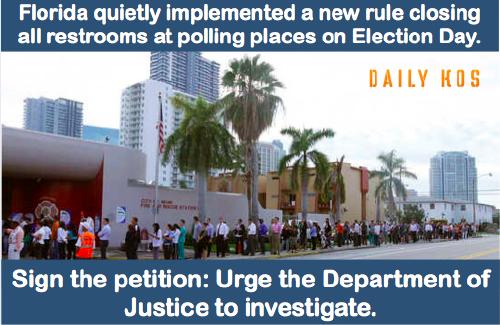
Claim: The Miami-Dade County Elections Department has implemented a policy to close the bathrooms at all polling facilities.
Examples: [Collected via Facebook, April 2014]
Remember how bad the voter lines were on Election Day in 2012? In Florida, some stayed in line for over six hours.
And now, they won't be able to use the bathroom. The Miami-Dade County Elections Department has quietly implemented a policy to close the bathrooms at all polling facilities.
Make no mistake about it. This is a political scheme to depress voter turnout in a heavily Democratic county, and it's also probably illegal for violating basic disability law.
Urge U.S. Attorney General Eric Holder to investigate this new Florida voting rule which closes all restrooms at polling places on Election Day.

Origins: The April 2014 political item quoted above maintained that the Miami-Dade County Elections Department had implemented a new policy ordering that bathrooms at all polling places in that county be closed on election days, a move cast as an attempt to "depress voter turnout in a heavily Democratic county." However, the ire provoked by this item may have been premature, as the issue of whether such a policy was ever actually set or implemented is currently a matter of some dispute.
According to one advocate who works with people with disabilities in the Miami area, after he inquired with the county Elections Department about access for the disabled at polling places a few years ago, he received a response in August 2013 (and again in February 2014) stating that as a means of ensuring that the disabled were "not treated unfairly," all restrooms in polling places would be closed on Election Day:
When he inquired about accessible restrooms, he figured the county would consider adding some Port-A-Potties. Instead, he said he was shocked by their response. "In order to avoid discriminating against voters with disabilities, they decided the policy they would put in effect would be to close restrooms in all polling places throughout the county, providing access to no one," Dubin [said]. In an email dated August 1st, 2013, Deputy Supervisor of Elections John Mendez told Dubin "in order to ensure that individuals with disabilities are not treated unfairly, the use of rest rooms by the Voters is not allowed on election day." On February 11, 2014, Assistant County Attorney Shanika Graves wrote Dubin to say "the Department's policy is not to permit access to restrooms at polling sites on election days."
Marc Dubin, the advocacy director for the Center for Independent Living of South Florida, said he asked the Elections Department two years ago to look into improving access for people with disabilities at polling places.
However, the county's Chief Deputy Supervisor of Elections has maintained that the Elections Department has no policy covering restroom use at polling places, stating that public facilities used as polling places have bathrooms that are usually open to the public regardless, and that the operators of private facilities used as polling places make their own determinations as to whether to provide restroom access to voters:
When [WFOR] contacted the Elections Department for comment, Chief Deputy Supervisor of Elections Christina White wrote: "In actuality, the Elections Department does not have a specific policy for bathroom usage ... Public facilities of course have restrooms that are open to the public. In the case of private facilities, we defer to the owner/operators policy on the use of their restroom."
That's the same basic information that most news sources have reported: although Marc Dubin may have received two
Number One and Number Two are fine in publicly owned voting sites, such as libraries and city halls, where bathrooms are open for anyone to use. The problem might arise when precincts are located in private buildings, which don't have to allow public bathroom access, or in churches and other religious facilities, which are exempt from federal law requiring accessible restrooms for people with disabilities. Elections administrators have long relied on those locations to set up Miami-Dade's more than But the two emails [received by Dubin] were contradicted by Christina White, the elections department's chief deputy supervisor, who told the Miami Herald that poll workers have always allowed voters — disabled or "For somebody who's voting, of course, we will allow them to use the restroom," she said. The county provides disabled parking and wheelchair-accessible ramps in polling places that don’t already offer it. But bathrooms, either for the disabled or anyone else, are not part of the deal, and allowing voters to tinkle is up to each building owner or operator. Other than the emails to Dubin, there’s no formal bathroom policy. To Dubin's broader point about disabled access, though, White did concede that the county's position is that it doesn't have to provide those restrooms at polling places — because the county says it doesn’t have to provide any restrooms, period. "There's no legal requirement for us to provide bathroom access, but we, as a courtesy to our voters, do when there is a bathroom at the polling place," she said. "That's not always possible."
Emails from a deputy elections supervisor and an assistant county attorney say Miami-Dade voters are banned from using restrooms at polling places. But the chief deputy elections supervisor pooh-poohed the notion.
Last updated: 16 April 2014
Sources: |
Mazzei, Patricia. "For Miami-Dade County, a Dispute Over Potty Breaks for Voters." WFOR-TV. 10 April 2014. Pastrana, Lauren. "Can Miami-Dade Voters Use Restrooms at Polling Places or Not?" WFOR-TV. 10 April 2014.
